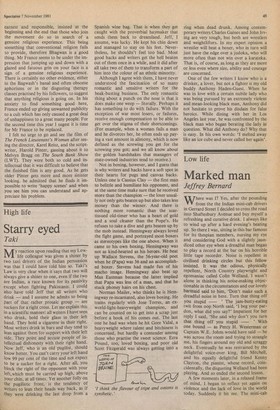High life
Starry eyed
Tab
My reaction upon reading that my Lowlife colleague was given a shiner by two taxi drivers of the Indian persuasion was that I could have told him so. Taki's Law is very clear when it says that two will always give a shiner to one, even if the two are Indian, a race known for its passivity except when fighting Pakistanis. I could also have told Jeff that all writers who drink — and I assume he admits to being Part of that rather prosaic group — are suckers for a right cross. Let me explain this in a scientific manner: all wEiters I have seen who drink, hold their glass in their left hand. They hold a cigarette in their right. Most writers drink in bars and they tend to lean against them for support with their left Side. They point and accuse people of intellectual dishonesty with their right hand. Now Jeff, who is an old pugilist, should know better. You can't carry your left hand low 99 per cent of the time and not expect to be a sucker for a right. After all, you block the right of the opponent with your left,which must be carried up high, above Your chin, at all times. Yet another folly on the pugilistic front, is the tendency of Writers to lean their heads way back, as if they were drinking the last drop from a Spanish wine bag. That is when they get caught with the proverbial haymaker that sends them back to dreamland. Jeff, I assume, was lucky. He kept his chin down and managed to stay on his feet. Nevertheless, he shouldn't feel too bad. Most good hacks and writers get the hell beaten out of them once in a while, and it did after all take two of them to transform a part of him into the colour of an ethnic minority.
Although I agree with them, I have never understood the fascination of so many romantic and sensitive writers for the beak-busting business. The only romantic thing about a punch on the nose is that it does make one weep — literally. Perhaps it has something to do with failure. With the exception of war most losers, or failures, receive enough compensation to be able to get over the stigma of their shortcomings. (For example, when a woman fails a man and he divorces her, he often ends up paying a vast amount in alimony, which is now defined as the screwing you get for the screwing you got; and we all know about the golden handshakes that managers of state-owned industries tend to receive.) Not in boxing, however, and I guess that is why writers and hacks have a soft spot in their hearts for pugs and canvas backs. Unless one is Cassius Clay — the first man to belittle and humiliate his opponent, and at the same time make sure that he received more than the champion — the loser usually not only gets beaten up but also takes less money than the winner. And there is nothing more romantic than the scartissued old-timer who has a heart of gold and a soul cleaner than the Pope's. He refuses to take a dive and gets beaten up by the mob instead. Hemingway always loved the fight game, and portrayed most boxers as stereotypes like the one above. When it came to his own boxing, Hemingway was not as kind-hearted as his heroes. He beat up Wallace Stevens, the 56-year-old poet when he (Papa) was 36 and an accomplished boxer. Stevens had made fun of his macho image. Hemingway also beat up Max Eastman because the latter implied that Papa was less of a man, and that he stuck phoney hairs on his chest.
Norman Mailer, who thinks he is Hemingway re-incarnated, also loves boxing. He trains regularly with Jose Torres, an exworld-light-heavyweight champion, and can be counted on to get into a scrap just before a book of his comes out. The last one he had was when he hit Gore Vidal, a heavyweight where talent and bitchiness is concerned, but hardly a contender among those who practise the sweet science. Ezra Pound, too, loved boxing, and poor old Scott Fitzgerald was always getting into a ring when dead drunk. Among contemporary writers Charles Gaines and John Irving are very tough, but both are wrestlers and weightlifters. In my expert opinion a wrestler will beat a boxer, who in turn will just have the edge over a judoka, who will more often than not win over a karateka. That is, of course, as long as they are more or less even where size, ability and courage are concerned.
One of the few writers I know who is a drinker, a lover, but not a fighter is my old buddy Anthony Haden-Guest. When he was in love with a certain nubile lady who was being pursued by an extremely violent and mean-looking black man, Anthony did not hesitate to prove his disdain for false heroics. While dining with her in Los Angeles last year, he was confronted by the black man who began berating the lady in question. What did Anthony do? Why that is easy. In his own words: 'I melted away like an ice cube and never called her again'.


























































 Previous page
Previous page